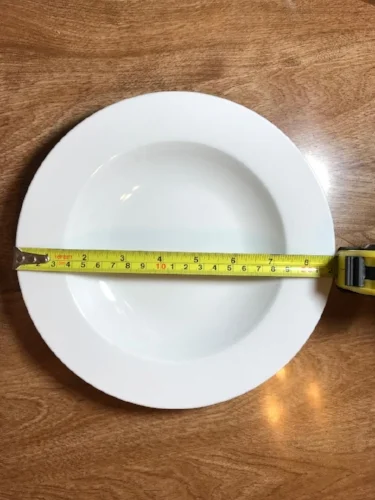10 Mindful Eating Practices for Portion Control & A Better Relationship with Food
In America, our food mentality tends to be "bigger is better." However, bigger portions do not necessarily equal better nutritional value. "Supersizing" our portions leads to "Supersizing" our bodies, especially when filling up on empty calories from processed and fattening foods. Below, I've outlined ten easy mindful eating practices to help you maintain a healthy relationship with food, as well as help control your food intake to only eat until your body is nutritionally satisfied.
10 Ways to Practice Mindful Eating
Ask yourself if you're really hungry, or just bored; or if you're eating just because the food is there, not because your body actually needs it.
Pay attention to the real signs of hunger: stomach growling, low energy, etc. Also, listen to your cravings. Your body is asking you for the nutrients it needs. For instance, a banana craving could mean that your body needs more potassium.
Eat slower. Your brain will have time to catch up with your body and know when you're full and that it's time to stop eating.
Chew more. Chewing your food more not only slows you down while eating (see #2) but also aids in digestion by helping to more thoroughly break down your food before it enters the rest of your digestive system.
Don't let your diet be lead by your emotions. Avoid turning to food when you're stressed, sad or otherwise experiencing emotional upheaval.
Drink water. It helps to fill you up, flush your system, and to know if you're truly hungry and need to eat or are possibly just dehydrated. If you're still feeling hungry after you drink the water, it may be time to eat.
Plan your eating. You are less likely to make a bad food choice if when and what you eat are pre-planned; that includes planning healthy snacks. This can be hard to do with busy and varied schedules, but I believe God will give us the time we need to do things right for our bodies. And, if you plan to eat before you are at the point of being ravenous, you'll be less likely to overeat.
Eat sitting down at the table with an actual plate. You are more likely to overeat if you eat standing up and/or out of containers as opposed to sitting down with an actual plate and utensils.
Eat for nutritional satisfaction. If your diet consists of healthy, whole foods that satisfy you nutritionally, you'll get full faster and only eat until your body gets what it needs. Filling up on processed and junk foods gives you empty calories that don't sustain energy or good health, as well as lead to other negative health issues. This is also what balances out the cost of eating healthier: when you only eat until you are satisfied nutritionally, you will most likely end up eating less.
Don't eat and multitask. This can also be a hard one, but think about movie popcorn. You're eating while watching the movie and before you know it, you've eaten an entire humongous bucket of popcorn all by yourself! If you are not distracted (by work, driving, the T.V., your phone, etc.) while eating, you will be much more aware of how much you are eating and when you are satisfied and it's time to stop.
BONUS TIP: Engage your other senses. At my mindful eating demos, one activity I like to do is a mindful eating practice with a single raisin. I have participants look at the raisin, feel it in their hand, and even smell it. One common observation from participants after smelling the raisin is that they can smell how sweet it is. Noticing how strong the natural sugar is in the raisin by smelling it, rather than just shoving a bunch in your mouth at one time, helps your body to recognize how much is enough. The same goes for other foods, when you engage your other senses while eating, not only do you gain a greater appreciation for what you're eating, but your brain and body can work together intuitively to decide if and how much of the food you actually need.
©2017 Cazoshay Marie. All rights reserved. Unauthorized use and/or duplication of this material without express and written permission from this blog’s author and/or owner is strictly prohibited. Excerpts and links may be used, provided that full and clear credit is given to Cazoshay Marie with appropriate and specific direction to the original content.
D.I.D. with Cazoshay and its materials are not intended to treat, diagnose, cure or prevent any disease. All material on this blog is provided for educational purposes only. Always seek the advice of your physician or another qualified healthcare provider for any questions you have regarding a medical condition, and before undertaking any diet, exercise or other health related program.
